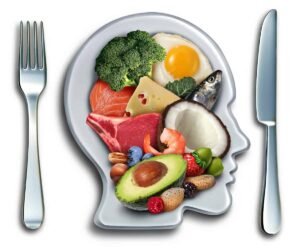
Introduction

In today’s fast-paced world, it’s no surprise that people are looking for ways to boost mental health and improve cognitive performance. From battling stress and anxiety to enhancing memory and focus, brain health plays a crucial role in overall well-being. One diet that has recently gained attention for its mental health benefits is the keto diet. This high-fat, low-carb eating plan has been proven to aid weight loss and metabolic health, but it may also have significant effects on brain power.
In this ultimate guide, we will explore how the keto diet for mental health can be a powerful tool for enhancing brain function, improving mood, and reducing stress. Whether you’re looking to boost your mental clarity or seeking relief from mood disorders, this guide will provide the insights you need to understand how keto can help you feel better mentally and emotionally .Unlocking Unbelievable Health Rewards: 5 Life-Changing Benefits of the Keto Meal
What is the Keto Diet?
The keto diet is a high-fat, low-carbohydrate dietary plan that forces your body into a metabolic state known as ketosis. In ketosis, the body shifts from using carbohydrates as its primary energy source to burning fat for fuel. This metabolic state leads to the production of ketones, which are used by the body as an efficient energy source, particularly for the brain.
The keto diet typically involves getting about 70-80% of your daily calories from fats, 15-20% from protein, and only 5-10% from carbohydrates. Common foods on the keto diet include avocados, meats, eggs, full-fat dairy, nuts, and leafy greens, while grains, sugars, and most fruits are restricted.
While most people are familiar with the keto diet’s impact on weight loss, fewer are aware of its potential to enhance mental health. The focus of this article is on how the keto diet can benefit brain function and mental well-being.
How the Keto Diet Affects the Brain
Your brain is a highly energy-demanding organ, consuming a significant portion of the body’s total energy. In a typical diet, glucose derived from carbohydrates is the brain’s primary source of energy. However, when you adopt the keto diet, your body produces ketones—alternative molecules that serve as an energy source for your brain.
Ketones have been shown to have multiple benefits for the brain, including enhancing cognitive performance, improving memory, and offering neuroprotective effects. By providing the brain with a more efficient and consistent energy source, the keto diet can help stabilize mood, improve focus, and increase mental clarity.
In addition, ketones have been linked to the reduction of oxidative stress and inflammation in the brain, both of which contribute to mental fatigue and cognitive decline.
The Science Behind Keto and Mental Health
The science behind the keto diet’s impact on mental health is still evolving, but emerging research suggests that ketosis can positively influence brain function and mood. Studies have shown that ketones are neuroprotective, meaning they can protect the brain from damage caused by free radicals and oxidative stress.
Additionally, ketones provide the brain with a more stable energy source than glucose. Unlike glucose, which is subject to fluctuations based on blood sugar levels, ketones offer a consistent supply of energy, which can improve mood, focus, and overall cognitive function.
Some studies have also indicated that ketones may help reduce inflammation in the brain, which is a contributing factor to mental health disorders like anxiety, depression, and neurodegenerative diseases. By reducing inflammation, the keto diet may promote a calmer, more focused state of mind.
Key Nutrients in the Keto Diet that Enhance Brain Power
While the primary focus of the keto diet is on fats and proteins, it’s important to recognize the specific nutrients that support brain function. Here are a few key nutrients that are abundant in a keto diet and benefit brain health:
- Omega-3 Fatty Acids: These healthy fats, found in fatty fish like salmon and in sources like flaxseeds and walnuts, are known for their brain-boosting properties. Omega-3s help reduce inflammation, improve memory, and support the production of brain cells.
- Magnesium: Magnesium plays a crucial role in brain function and is involved in neurotransmission. Keto-friendly foods rich in magnesium include spinach, almonds, and pumpkin seeds.
- Choline: Found in foods like eggs, choline is essential for the production of acetylcholine, a neurotransmitter that plays a key role in memory and learning.
- B Vitamins: B vitamins, especially B6, B9 (folate), and B12, are vital for brain health. They help regulate mood, energy levels, and cognitive function. Foods like leafy greens, eggs, and meat are excellent sources of B vitamins.
- Antioxidants: Berries, avocados, and nuts provide antioxidants, which combat oxidative stress and help protect brain cells from damage.
By incorporating these nutrients into a keto meal plan, you can ensure that your brain is receiving the fuel it needs to function at its best.
Keto and Neuroprotection
One of the most exciting benefits of the keto diet is its potential neuroprotective effects. Research has shown that ketones have the ability to protect brain cells from damage caused by oxidative stress and inflammation. This is particularly important for individuals at risk of developing neurodegenerative diseases like Alzheimer’s and Parkinson’s.
The neuroprotective effects of keto extend beyond just protecting against neurodegeneration; ketosis may also help repair damaged brain cells and improve cognitive function in individuals with existing brain injuries.
The ability of the keto diet to promote brain cell regeneration and repair is due to its influence on brain-derived neurotrophic factor (BDNF), a protein that supports the growth of new neurons and synapses in the brain. Increased levels of BDNF have been associated with improved cognitive function, memory, and mood.
Keto for Mood and Stress Management
When it comes to mental health, one of the most compelling benefits of the keto diet is its potential to alleviate symptoms of anxiety and depression. The brain’s energy source plays a significant role in regulating mood, and the keto diet’s ability to provide a steady supply of ketones can help stabilize emotions.
In fact, some research has shown that the keto diet can increase the production of GABA (gamma-aminobutyric acid), a neurotransmitter that has a calming effect on the brain. This increase in GABA levels can help reduce anxiety and promote a sense of relaxation.
Moreover, the reduction of blood sugar fluctuations on the keto diet can help stabilize mood swings. Many individuals who experience mood swings due to blood sugar spikes and crashes may find relief by adopting a keto lifestyle.
How Keto Improves Cognitive Function
Improved cognitive function is one of the most touted benefits of the keto diet. Ketones have been shown to enhance mental clarity, focus, and memory. The brain’s ability to perform complex tasks is closely tied to its energy levels, and the steady, efficient supply of energy from ketones supports sustained mental performance throughout the day.
Many individuals report that they experience increased focus and better mental performance once they transition to the keto diet. Whether you’re working on a difficult project or studying for an exam, the improved cognitive function provided by the keto diet can give you a mental edge.
Additionally, the keto diet may help reduce brain fog, a common complaint of those who consume high-carbohydrate diets. By cutting out the carbs and fueling your brain with fat, you may notice that your thoughts become clearer and more organized.
The Link Between Ketones and Brain Energy
Ketones are not just an alternative energy source for the brain—they are often a more efficient one. When your body switches to using fat for fuel (through ketosis), it produces beta-hydroxybutyrate (BHB), a ketone body that can cross the blood-brain barrier and provide the brain with a steady source of energy.
This steady supply of energy allows the brain to function more efficiently, without the fluctuations in energy levels that can occur with carbohydrate metabolism. When you’re burning fat for energy, your brain has a consistent, long-lasting source of fuel, leading to better cognitive function, focus, and mental clarity.
Keto and Depression
Depression is a widespread mental health condition that affects millions of people worldwide. Traditional treatments for depression often involve medications that aim to regulate neurotransmitter levels, but recent studies suggest that the keto diet may provide a natural, alternative way to alleviate depression symptoms.
Research indicates that ketones can help modulate the brain’s neurotransmitters, including serotonin and dopamine, which are closely linked to mood regulation. By boosting ketone production, the keto diet may help increase the levels of these mood-regulating neurotransmitters, thus improving overall mood and reducing feelings of sadness and hopelessness.
Can Keto Help with Anxiety?
Yes! The keto diet has been shown to have a calming effect on the brain, which can help reduce symptoms of anxiety. As mentioned earlier, ketones help boost GABA levels, a neurotransmitter responsible for inhibiting excessive brain activity. This increase in GABA can have a sedative effect, helping individuals with anxiety feel more relaxed and at ease.
Additionally, the stable blood sugar levels promoted by the keto diet can help reduce the physiological effects of stress, such as the release of cortisol, a hormone that is often elevated in response to anxiety.
The Role of Omega-3 Fatty Acids in Mental Health on Keto
As mentioned earlier, omega-3 fatty acids are critical for brain health. These essential fats are abundant in fatty fish like salmon and mackerel, as well as in flaxseeds and walnuts. Omega-3s help reduce inflammation in the brain, support neurogenesis (the creation of new neurons), and protect against cognitive decline.
Including plenty of omega-3-rich foods in your keto diet will not only support mental health but also help improve your cognitive function and memory. Omega-3s are especially important in managing depression and anxiety, as they help regulate mood and support brain function.
Is Keto Helpful for Mental Disorders like ADHD?
There is promising evidence suggesting that the keto diet may be beneficial for individuals with ADHD (Attention Deficit Hyperactivity Disorder). The diet’s impact on neurotransmitter regulation, particularly the balance between dopamine and serotonin, may help improve attention, focus, and impulse control.
While more research is needed, early studies suggest that the keto diet may be a helpful adjunct treatment for those managing ADHD symptoms.
Keto and Alzheimer’s Disease
Alzheimer’s disease is a devastating neurodegenerative disorder that affects millions of people worldwide. Recent research has explored the potential of the keto diet in slowing the progression of Alzheimer’s.
Studies have shown that the ketogenic diet may help reduce amyloid plaques (protein clumps that contribute to Alzheimer’s) and improve brain function in individuals with early-stage Alzheimer’s. While more research is needed, the early findings are promising.
How to Get Started with the Keto Diet for Mental Health
If you’re ready to try the keto diet for mental health, here’s a simple guide to get you started:
- Understand the basics of the keto diet: Learn about the macronutrient ratios—high fats, moderate protein, and very low carbs.
- Focus on whole, nutrient-dense foods: Include healthy fats like avocado, olive oil, and fatty fish, along with low-carb vegetables and lean proteins.
- Stay hydrated: Drink plenty of water and replenish electrolytes to avoid keto flu.
- Track your progress: Use a food tracking app to monitor your carb intake and ensure you’re staying in ketosis.
- Be patient: It may take a few days or even weeks for you to fully experience the mental health benefits of keto.
Challenges of Using Keto for Mental Health
While the keto diet can be beneficial for mental health, it may not be suitable for everyone. Transitioning to keto can cause temporary discomfort, known as keto flu, which includes symptoms like fatigue, headaches, and irritability. Additionally, the restrictive nature of the diet may be difficult to sustain for some people in the long term.
It’s important to listen to your body and adjust your diet accordingly. If you experience any negative side effects, consult with a healthcare professional.
Conclusion
The keto diet offers a wide range of benefits for mental health, including improved brain function, mood regulation, and protection against neurodegenerative diseases. Whether you’re looking to enhance focus, reduce stress, or support overall cognitive health, keto may be a powerful tool in your mental wellness toolkit.
With its ability to stabilize energy levels, promote neuroprotection, and improve neurotransmitter function, the keto diet is well worth considering for anyone seeking to boost their brain power and mental well-being.
FAQs
1. Can keto improve brain function?
Yes! The keto diet provides the brain with an efficient source of energy (ketones), which can enhance focus, memory, and overall cognitive function.
2. Does the keto diet help with anxiety?
Yes, the keto diet may help alleviate anxiety by increasing GABA levels in the brain, which has a calming effect.
3. Is the keto diet effective for depression?
Studies suggest that the keto diet can help improve mood by regulating neurotransmitters like serotonin and dopamine.
4. Can the keto diet help with ADHD symptoms?
There is emerging evidence suggesting that the keto diet may help manage symptoms of ADHD, such as inattention and impulsivity.
5. How do I start the keto diet for mental health?
Start by understanding the basic principles of the keto diet, focusing on healthy fats, moderate protein, and low carbs. Track your progress and stay hydrated to ease the transition.




